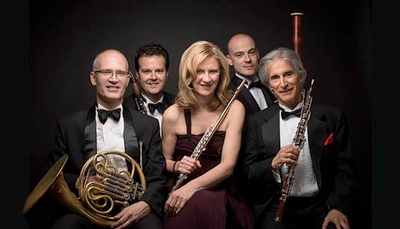by Mike Telin

On Monday, November 13 at 7:30 pm at West Shore Unitarian Universalist Church, the hat-trick will be scored when Rocky River Chamber Music Society plays host to the legendary Dorian Wind Quintet — Gretchen Pusch, flute, Gerard Reuter, oboe, Benjamin Fingland, clarinet, Adrian Morejon, bassoon, and Karl Kremer-Johansen, horn. The free concert will feature works by Bach, Dvořák, and Harberg.
Formed at Tanglewood in 1961, the Dorian is one of chamber music’s longest continuously active ensembles. They have concertized in 48 states and Canada, toured Europe 18 times, and performed throughout the Middle East, India, Africa, and Asia. The ensemble made history in 1981, when they became the first wind quintet to appear at Carnegie Hall.
Since their founding the Dorian has commissioned nearly 40 works from composers including Luciano Berio, Joan Tower, Mario Davidovsky, Bruce Adolphe, Lukas Foss, Jacob Druckman, Billy Childs, Lee Hoiby, David Del Tredici, and Sir Richard Rodney Bennett. George Perle’s Wind Quintet No. 4, commissioned by the Dorian, won the Pulitzer Prize for Music in 1986, the first Pulitzer ever awarded for a wind quintet.
Continuing that tradition, bassoonist Adrian Morejon said in a recent telephone conversation that they are “thrilled” to be playing their latest commission, Amanda Harberg’s Suite for Wind Quintet, on Monday’s concert.
“I think it is going to be a great addition to the repertoire. We only did the premiere back in March but we’ve already played it quite a bit. We took it to Mexico, Las Vegas, Nebraska, New York, and now to Cleveland and then Erie. Audiences have a desire to hear more wind repertoire, and it’s nice to see wind players from all these regions responding to it so positively.”
When asked how they first came to know Harberg, Morejon chuckled. “I don’t mind telling you because we joke about it from the stage,” he said. “It was at a bar where Ben, our clarinetist, was celebrating his birthday. Amanda is good friends with Ben and his wife who’s a violist. Our flutist Gretchen and her husband Richard were also there. The whole social thing was happening and before we knew it, Richard proposed that we commission her to write us a piece. And then, because of the relationships involved, at the first rehearsal there was a huge sigh of relief. You never know what you’re going to get from any composer — but this is an amazing piece.”
Another Dorian tradition is performing Bach transcriptions. Next week’s concert will include a Dance Suite extracted from an arrangement of the complete Goldberg Variations by Henry Brant. Morejon said that since playing the entire piece would be a program in itself, they thought about ways to present parts of it.
“After looking at all the variations closely, we realized that a perfect number of them were in dance-suite style and we could create a nice dance suite that could stand alone. We switched the ordering of a few, but we start and end with the aria just like the original. It was a fun idea but we needed to make sure it was a good musical decision — we didn’t want it to sound like we just cut up the piece. We’ve performed it several times and received good responses from audiences and presenters.”
The Quintet’s horn player Karl Kramer-Johansen’s arrangement of Dvořák’s String Quartet in A-flat, Op. 105, is also a newer addition to the Dorian’s repertoire. “We’ve performed the Op. 51 quartet many times,” Morejon said, “and because of the proportions of slow to fast music, we’re finding that Op. 105 is not as exhausting to play. It has a lot of lively music and as wind players we appreciate that, but it’s still a long piece. We premiered it a couple of weeks ago in Nebraska.”
Morejon said that wind quintet transcriptions of works like the Dvořák help to fill a very large gap in repertoire. “Winds had their golden era with Franz Danzi and Anton Reicha. For a while there was a lack of activity, then in the 20th century things picked up again but with a very different style of quintet writing. The Dvořák comes from a period when the wind quintet was not fortunate enough to have repertoire.”
Having grown up listening to Dorian Quintet recordings, Morejon was delighted to be asked to join the group. “As a wind player, during my undergraduate years at Curtis, the goal was to get an orchestra job. And when I went to Yale I was fortunate to have a lot of wind faculty who had made careers in chamber music. That was a big turning point for me because it made me think about other options. These days the entrepreneurial musician is much in demand. You see musicians doing a little of everything.”
Morejon is the newest member of the Quintet as well as only the fourth bassoonist in their 56-year history. “Jane Taylor was a founding member and played in the group for 40 years. She was a real driving force behind the group, which is why other instruments have had more turnover while the bassoon hasn’t.”
Published on ClevelandClassical.com November 7, 2017.
Click here for a printable copy of this article



